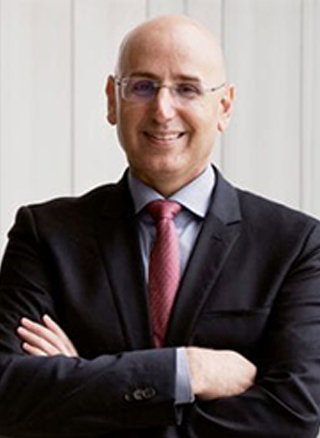New Data Shows Heart Pump Extends Life Beyond Five Years for Advanced Heart Failure Patients
Aug 29, 2022
New York, NY

For the first time, new data shows patients with advanced heart failure who receive a heart pump can survive five years and beyond, according to the MOMENTUM 3 study. The trial is the world’s largest randomized clinical trial to assess long-term outcomes in people receiving a left ventricular assist device, known as an LVAD, or heart pump, to treat advanced heart failure.
The data were presented during a late-breaking session at the 2022 European Society of Cardiology Congress in Barcelona, Spain.
Patients with advanced heart failure who don’t receive either a heart pump or heart transplant have less than two years to live, according to prior studies.
Dr. Nir Uriel
“In the past, patients with advanced heart failure had few options beyond heart transplant but this study shows that is no longer the case,” said Dr. Nir Uriel, director of advanced heart failure and cardiac transplantation at NewYork-Presbyterian, the senior author and co-principal investigator of the trial. “The MOMENTUM 3 results offer hope for thousands of patients with advanced heart failure, showing that a heart pump can both extend their survival and quality of life, giving the gift of more time with their loved ones and the opportunity to not only survive but thrive.”
An estimated 6.2 million Americans are currently living with heart failure – when your heart fails to pump blood as it should. Heart failure is responsible for 1 in 8 deaths in the U.S. per year, according to the Centers for Disease Control and Prevention.
Historically, many advanced heart failure patients who don’t qualify for a heart transplant rely on medication or are referred to palliative care to manage symptoms. Newer advancements in heart pumps can provide this population another life-prolonging option. The benefits of heart pumps are especially true for the estimated 15,000 advanced heart failure patients whose median life expectancy is under two years because they are on heart medication alone. While some of these patients await a donor heart, due to a limited number of organs available, heart pumps can improve survival while offering immediate, significant and sustained quality of life.
“The data also demonstrate that the five-year survival for HeartMate3 patients – nearly 60% – is approaching what we would expect for the five-year survival rates of heart transplant recipients who have a similar risk profile,” said Dr. Uriel, who is also a professor of medicine in the Division of Cardiology at Columbia University Vagelos College of Physicians and Surgeons and an adjunct professor of medicine in the Greenberg Division of Cardiology at Weill Cornell Medicine. “This is a great outcome for patients with advanced heart failure, who are typically very sick.”
The MOMENTUM 3 (Multicenter Study of MagLev Technology in Patients Undergoing Mechanical Circulatory Support Therapy With HeartMate 3) is an observational study that compared Abbott’s latest device, HeartMate3, with the HeartMate II pump, following more than 1,000 patients in 69 U.S. centers. The findings showed among patients with advanced heart failure, those that received the HeartMate3 (a newer generation device with a magnetically levitated motor that creates a frictionless pump) versus the HeartMate II, powered through axial flow (a motor that does create friction), was associated with a better outcome and higher likelihood of overall survival at five years. Results showed improved survival rate of 58% for those who received the HeartMate3, vs. 44% with the HeartMate II. Greater survival was largely associated with a reduction in deaths due to stroke, clotting and bleeding compared to HeartMate II.
“For a long time, the challenge was that we did not know what the long-term survival for heart pumps could be,” said Dr. Uriel. “Now, we know we can provide our patients with another meaningful option – heart failure does not need to be deadly anymore.”
The paper is titled, “5-year outcomes in patients with fully magnetically levitated vs axial-flow left-ventricular assist devices in the MOMENTUM-3 randomized trial”
The trial was sponsored by Abbott.
Dr. Uriel is the national co-principal investigator of the study with no financial compensation. He received a research grant from Abbott in connection to a different study.
Dr. Yoshifumi Naka, surgical director of heart failure, cardiac transplantation and mechanical circulatory support programs at NewYork-Presbyterian Hospital, is a contributing author.
NewYork-Presbyterian
NewYork-Presbyterian is one of the nation’s most comprehensive, integrated academic healthcare systems, encompassing 10 hospitals across the Greater New York area, nearly 200 primary and specialty care clinics and medical groups, and an array of telemedicine services.
A leader in medical education, NewYork-Presbyterian Hospital is the only academic medical center in the nation affiliated with two world-class medical schools, Weill Cornell Medicine and Columbia University Vagelos College of Physicians and Surgeons. This collaboration means patients have access to the country’s leading physicians, the full range of medical specialties, latest innovations in care, and research that is developing cures and saving lives.
Founded 250 years ago, NewYork-Presbyterian Hospital has a long legacy of medical breakthroughs and innovation, from the invention of the Pap test to pioneering the groundbreaking heart valve replacement procedure called TAVR.
NewYork-Presbyterian’s 48,000 employees and affiliated physicians are dedicated to providing the highest quality, most compassionate care to New Yorkers and patients from across the country and around the world.
For more information, visit www.nyp.org and find us on Facebook, Twitter, Instagram, and YouTube.
Media Contact:
Office of Communications [email protected]



